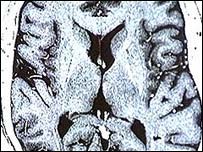Find the brain area 'Always think for others'
Scientists have found the brain to predict whether a person is selfish or someone who cares about others. The interest in others - the tendency to help others without self-interest - seems to be related to an area called the temporal groove above and behind.
Using brain endoscopic methods, US researchers found that the area involved a selfish behavior that took place in one's reality.
The study of Duke University Medical Center on 45 volunteers was published in the journal Nature Neuroscience (Science of Neuroscience in Nature).
Trends are not selfish

The brain area is in the group of ' always thinking for others ' (not selfish) that is more active. (Photo: BBC)
Participants were asked to disclose how often they participated in various help activities, such as doing charity work and also being asked to play a computer-designed game. to measure the level of interest in the needs and interests of others.
The authors of the study say their research may have important effects.
They are currently analyzing ways to study the development of this brain region at an early stage of life and believe that this information can help determine how the trends of thinking for others are established.
Researcher Dr. Scott Huettel explains: 'Although understanding the function of this brain region may not necessarily identify what motivates people like Mother Theresa, it can give us a strong the origin of important social behaviors such as caring for others. '
Help each other
Dr. George Fieldman, a member of the British Psychological Society and a principal psychology lecturer at Buckinghamshire Chilterns University, said there could be a brain area related to anxiety for others.
He added: 'If you can train from the beginning to be more caring about others, it is good for the community and if you can show that you have an impact on brain development then That's interesting.'
He said that real concern for the needs and interests of others is a rare and even impossible thing to grasp.
'This interest is often reciprocal - you do something for someone and ultimately look forward to getting something back. Other types are interest in relatives, giving their relatives and being cheated or horned. '
He said it was interesting to study people in two opposites who care about others and be selfish and see if their brains are significantly different.
Thien Kim
- 'Scanning the brain' to find the right partner
- Find out the area of the brain that shows generosity in people
- Brain area helps to shape people
- The surprising resemblance between the human brain and the dog
- The mysterious area in the human brain was first known
- Why do we feel pain when jealous?
- For the first time, scientists found the brain area that causes depression
- Human brain grows fastest right after birth
- Find new ways to treat brain tumors without surgery
- Stunned to find bacteria in the brain
- It took 25 years for the brain to develop completely
- Shocking facts about the human brain
 Green tea cleans teeth better than mouthwash?
Green tea cleans teeth better than mouthwash? Death kiss: This is why you should not let anyone kiss your baby's lips
Death kiss: This is why you should not let anyone kiss your baby's lips What is salmonellosis?
What is salmonellosis? Caution should be exercised when using aloe vera through eating and drinking
Caution should be exercised when using aloe vera through eating and drinking